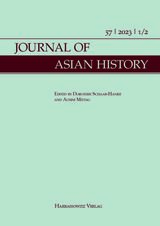Autor: Johannes Kurz
- «
- 1
- »
Die Suche erzielte 3 Treffer.
(Mis)reading Chinese Texts in Southeast Asian History: “Moliu”, Duoluomo and the Lure of “Srivijayan” Conquests research-article
The Creation of a Shared Past: Two Thousand Years of “Historical” China-Brunei Relations research-article
- «
- 1
- »
